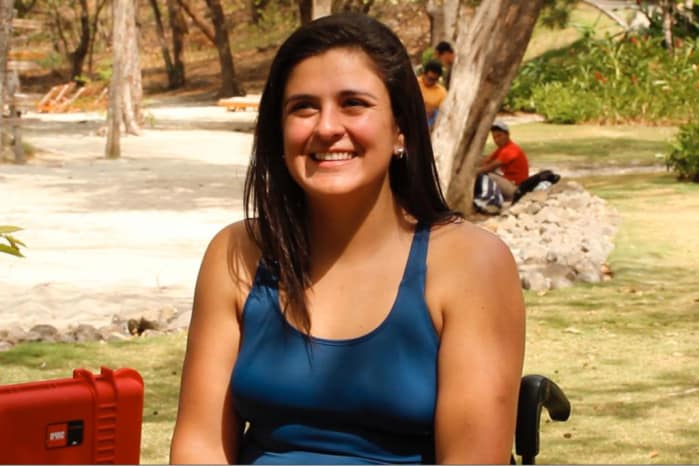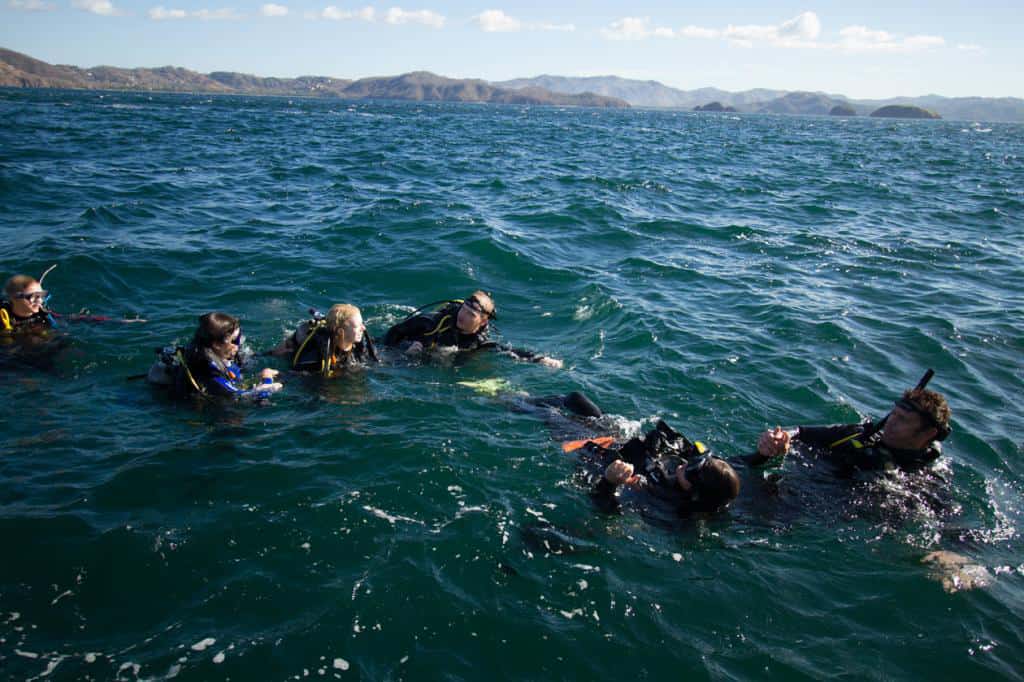The dive boat pitched in the waves at the mouth of Culebra Bay off the coast of the luxurious Papagayo Peninsula in Guanacaste. Schools of rays jumped out of the water in the distance, flashing their white bellies in the hot sun, unfazed by the waves and wind that buffeted the red and white Buzos de Aventura dive boat on Jan. 25.
Natalia Vindas’ smile hid behind a scuba mask and regulator as she floated in the choppy sea. Her legs rested near the surface as she and dive instructor Ernst van der Poll prepared to descend for one of her last skill dives. Vindas soon would become Costa Rica’s first certified disabled, van der Poll said.
“We’re opening a big door so that people with reduced mobility problems can access the type of sports that normally aren’t for people in wheelchairs,” Vindas, 29, told The Tico Times, still in her black wetsuit after the dive.
“I feel very proud to be the first Tica to break that paradigm and show people the only limits are the ones in your head,” she added.

Originally from Heredia, north of San José, Vindas became a civil engineer and traded the green mountains of the Central Valley for the pampas of Guanacaste, where she worked as a highway engineer.
One day in 2008, however, she lost control of her truck while not wearing a seatbelt on the job. The truck rolled and threw her from the vehicle, breaking her back.
At 21, Vindas lost most of the mobility below her waist, and much of the self-reliance that she had come to enjoy living on her own. She needed help dressing, bathing and getting around as she adapted to life in a wheelchair.
“That independence, that capacity to feel that I could do things for myself, that I could go where I wanted, that’s what I lost in the accident,” Vindas said. “That’s the part of diving I love, because it gives me back that independence. I feel so free, I forget about the wheelchair.”
A little over a year ago, Vindas heard about adaptive diving, scuba diving specialized for people with disabilities, and met van der Poll, who was married to an old friend of Vindas from school. She went on her first dive in August 2013 with van der Poll and attended a Discover Scuba event at the Four Seasons Papagayo last September, the first of its kind in Costa Rica.
Alonso Vindas, Natalia’s 20-year-old brother, took up scuba diving mostly as a way to help his sister at first. But he fell in love with the sport, too.
“We both like the same things, we’ve always been partners in adventures,” said Alonso Vindas, who was also completing one of his last skill dives.
The siblings teased each other on board the boat after Alonso’s shoulder-length hair caught in his mask. They commiserated on the less than ideal conditions on the water.
“The sea was rougher, more turbulent, more difficult to descend,” Vindas observed. The strong currents clouded their visibility.
Van der Poll said that Natalia Vindas took to diving naturally, quicker than many able-bodied divers he had taught.
The dive master said that they had to develop hand signals for Natalia, since she uses her hands to propel herself underwater.
“We’ve been teaching her to be autonomous,” van der Poll said, focusing on finding techniques so she can get her equipment on and off, use a weight belt and build strength.
After her first dive six months ago, Vindas set out to become the first certified disabled diver in Costa Rica. Thanks to support from Buzos de Aventura diving company, the Professional Association of Diving Instructors, and the Four Seasons, she has been able to achieve her goal. Vindas said she hopes to become certified as a rescue diver too.
“In the end that’s what it’s all about,” van der Poll said. “It’s about being inspired by something and then that inspiration follows through and gives purpose.”
That new sense of purpose inspired Natalia Vindas to go back to school.
She studies architecture, and plans to design buildings and public spaces that better accommodate people with disabilities.
“I’m a very restless person. I like to do a lot of things,” she said. “When I do something, I feel like I need to achieve something else to feel like I’m always pushing myself.”
That night, in the Four Seasons’ bar, Alonso Vindas leaned over the table to share more about his sister.
“A lot of people talk about her like she’s an example. No, just put yourself in her position. [People with disabilities] have the capacity to do it, maybe in a different way, but they can do it,” he said. “I see her as a brave person. Someone who didn’t let the accident conquer her.”






